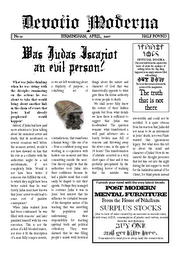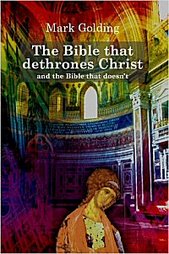Not only do we have a substantial epistemological crisis in the world that has largely produced two irreconcilable strands of thought concerning the source of human identity but also a conflict of reason and intellect within them used by adherents of either strand putting forward their political religious theories. Science has always been underpinned by a philosophical narrative by those who need to justify a moral position vis a vis its destructive application but these days the dichotomy of fact and value, liberty and aggression, individualism and social engineering is requiring a new regulative process called ’the creeping tyranny of State intervention at the philosophical level’. Science is not the issue. The mother of all tyrannies is a philosophical one based on Greek Myths.
One strand argues the origin of human identity is God and the other, nothing but a void. The shades of grey between God and nothing is infinitesimal, compounded by the inadequacy of language, but the polarisation is a bipolar phenomenon. The polarisation of believer and unbeliever is widening fast, to such an extent that even local council directives in the UK have abandoned the non-aggressive libertarian tolerance of individual rights for the more legalistic approach of outlawing faith groups all in the name of the Greek Myth called ‘Democracy’. The reconstruction of society following cycles of self defeating conflict is like a merry go round; spinning on the mono-culture of the war economy. The urgency on both sides is to knock each other off the road map to heaven without having a single clue as to what it is that constitutes heaven, the ideal state of existence. Instead the epistemology is about regurgitating Ancient Ideas as a kind of continuity of design.
Expressed in this simplistic way the argument looks as if we have a crude choice between God or nothing, Heaven or Hell, eternal gain or oblivion. Without a deep analysis of the semantics of language, or indeed a full proof explanation for the etymology of every symbol, every form of expression, it is possible to organise any orthodoxy you like that will inevitably win a jury over to accepting your point of view. Winning the argument is what conflict is all about and the direction of a dialogue is generally driven by the one who possesses more knowledge than the other in this arena of appropriated knowledge.
Jesus Christ had few friends when he started out with his mission to talk about his identity as the Son of God. In fact, he had more enemies than he bargained for and spent a lot of time ducking and diving from stones and angry people (men and women). Cherished by the close knit community in which he was nurtured one would have thought that his life was secure in the hands of a society of friends who had bonded together in a shared common identity. However, as things turned out, this ‘social bonding’ turned out to have little substance when their terms of reference for their identity was suddenly put under the pressure of some criticism from their little ‘naïve’ acolyte. Social norms gave way to a much deeper spiritual identity that lay beneath the veneer of social etiquette and middle class posturing.
Jesus got up in the Synagogue, as was the custom, to read something from their venerable book of Oracles, while heads nodded, ‘Look, there’s our son of Joseph, hasn’t he grown up to be such a handsome young man…’ By the time this squelchy sublime approbation had oozed into their territorial minds, Jesus had already commented on the passage he was reading by telling them plainly that the person their Oracles had been blarting on about for centuries had arrived and was standing before them. No sooner had they wallowed in a little community pride, a much less benign thought had already rebooted their mental system – totally. Isn’t Windows frustrating!
Oh Gosh. Oh really badly, awfully Gosh. What happened next, as recorded by John with such economy, is the beginning of the movement of a tectonic plate underpinning the whole artifice of a nation and the uprooting of their spiritual anchors to their Oracles, which has been slowly shaking their foundations ever since.
The dichotomy of identity is expressed violently in this passage from John’s Gospel in the way the ‘bonded community’ reacted. Jesus had no friends and no protection when he was set upon by a mob at the beginning of his trek into the dark and murky world of philosophy. For a good reason he attacked their identity and immediately the dichotomy of fact and value, the polarisation of the fact they identified with their ancestors and the value they placed on it by abandoning any concept of the sanctity of life when they tried to throw Jesus down the cliff, is where the split personality derives its impetus.
This narrative of philosophy has undergone paradigm shifts since the eloquent reasonings by Socrates and Plato towards adopting a more sinister totalitarian lexicon that has today become a science of control and social engineering that quiet frankly would scare the crap out of the metaphysical world it is trying to manipulate, if such a world had a voice.
Well, it has. Jesus Christ rising from the dead is a manifestation of the metaphysical world but the philosophical narrative surrounding this event requires no instruments of social and political theory to prove their truth and their value. The words themselves bear testimony to themselves that they are true. Moreover, the way countless philosophical societies have ingenuously tried very hard to discredit Jesus is a testimony to the gravity and power of his voice. A voice from the dead is a voice that is eternal.
A friend of Christ is a friend of mine but his enemies are also my enemies. If social bonding is the key to social development then I would rather bond with Christ than with communities like the one that turned on the young man Jesus. The flow of hostility towards Christ is a corollary of his universal authority.
Communities in the UK are being shaped by an army of unbelievers in every section of society where identity with their world view is becoming less of an option but more of a social and ‘moral’ obligation. The philosophical argument is about cohesion, the headache of 19th century rationalists, but the agenda is to win the perceived war against believers by using force; by using the threat and fear of social exclusion in Government regulated workplaces and/or imprisonment. Such practices reveal intellectual perversion.
Be very aware fellow followers of Jesus, the spirit that hated him before he was born, is a spirit that inhabits the narrative of secular philosophy, psychology and sciences. And they will have their way – for a short while.
Jesus points to an everlasting Kingdom that is way way beyond the asphyxiating and finite philosophy of aggression and violence.
Jesus trembled at the violence of the world the first time round but on His next visit the same narrative will be used in a slightly different context. The context will be as a means of judgment upon all the bloodshed caused by nations that have raged against him since Adam.
I'd rather be fearful of God than of irrelevant UK Directives trying to control life on a sinking ship.





No comments:
Post a Comment